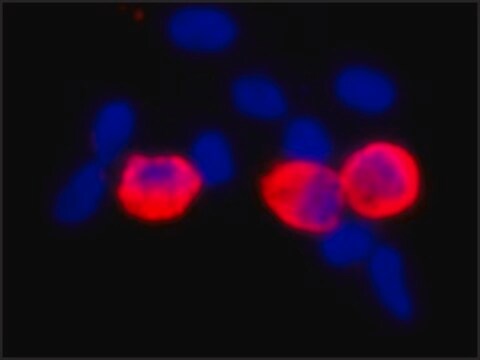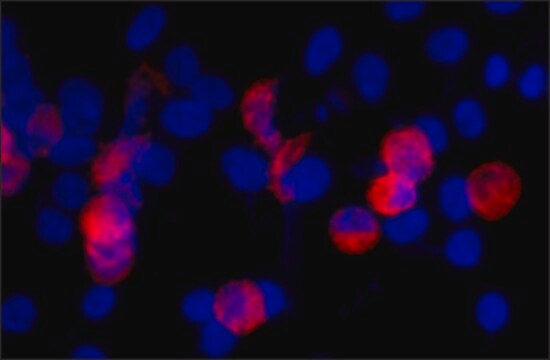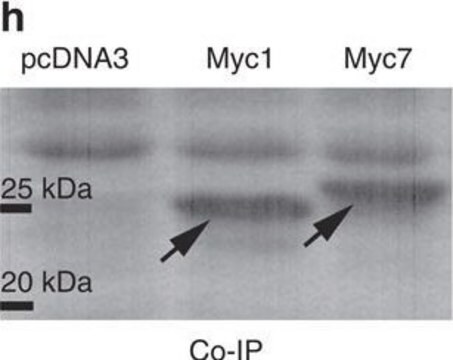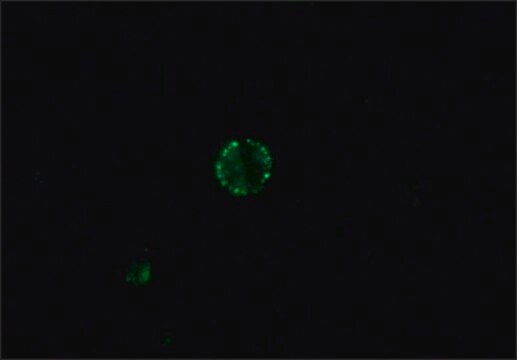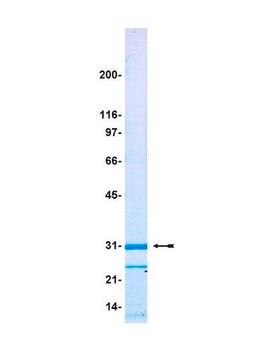おすすめの製品
由来生物
mouse
品質水準
結合体
CY3 conjugate
抗体製品の状態
purified immunoglobulin
抗体製品タイプ
primary antibodies
クローン
9E10, monoclonal
フォーム
buffered aqueous solution
交差性
human
テクニック
direct immunofluorescence: 1:50 using formalin-fixed, paraffin-embedded human colon carcinoma tissue
UniProtアクセッション番号
輸送温度
wet ice
保管温度
2-8°C
ターゲットの翻訳後修飾
unmodified
遺伝子情報
human ... MYC(4609)
類似した製品をお探しですか? 訪問 製品比較ガイド
詳細
Monoclonal Anti-c-myc (mouse IgG1 isotype) is derived from the 9E10 hybridoma produced by the fusion of mouse myeloma cells and splenocytes from an immunized BALB/c mouse. The c-Myc gene encodes a polypeptide with a predicted molecular weight of 49 kDa.
免疫原
ヒトp62c-Mycタンパク質の合成ペプチド。
アプリケーション
Monoclonal Anti-c-MycCy3™ antibody produced in mouse has been used in:
- western blotting
- immunocytochemistry
- Immunofluorescence
生物化学的/生理学的作用
The encoded protein is involved in cell proliferation, growth and apoptosis. The c-myc gene has been implicated in the development of a number of neoplasms in a variety of avian and mammalian species. The human c-myc protooncogene is the cellular homolog of the avian v-myc gene found in several leukemogenic retroviruses. Increased expression of the cellular oncogene c-myc has been described in a variety of human tumors, occurring by several different mechanisms, including gene amplification and chromosomal translocation.
物理的形状
0.01M PBS溶液 (1% BSA, 15mMアジ化ナトリウム含有)。
法的情報
Cy3 is a trademark of Cytiva
免責事項
Unless otherwise stated in our catalog or other company documentation accompanying the product(s), our products are intended for research use only and are not to be used for any other purpose, which includes but is not limited to, unauthorized commercial uses, in vitro diagnostic uses, ex vivo or in vivo therapeutic uses or any type of consumption or application to humans or animals.
適切な製品が見つかりませんか。
製品選択ツール.をお試しください
保管分類コード
10 - Combustible liquids
WGK
nwg
引火点(°F)
Not applicable
引火点(℃)
Not applicable
個人用保護具 (PPE)
Eyeshields, Gloves, multi-purpose combination respirator cartridge (US)
適用法令
試験研究用途を考慮した関連法令を主に挙げております。化学物質以外については、一部の情報のみ提供しています。 製品を安全かつ合法的に使用することは、使用者の義務です。最新情報により修正される場合があります。WEBの反映には時間を要することがあるため、適宜SDSをご参照ください。
Jan Code
C6594-.5ML:
C6594-1EA:
C6594-VAR:
C6594-1EA-KC:
C6594-BULK:
Nir London et al.
Biochemistry, 51(29), 5841-5850 (2012-06-19)
Interactions between Bcl-2-like proteins and BH3 domains play a key role in the regulation of apoptosis. Despite the overall structural similarity of their interaction with helical BH3 domains, Bcl-2-like proteins exhibit an intricate spectrum of binding specificities whose underlying basis
Sanjib Dutta et al.
Journal of molecular biology, 398(5), 747-762 (2010-04-07)
Interactions among Bcl-2 family proteins are important for regulating apoptosis. Prosurvival members of the family interact with proapoptotic BH3 (Bcl-2-homology-3)-only members, inhibiting execution of cell death through the mitochondrial pathway. Structurally, this interaction is mediated by binding of the alpha-helical
A highly secreted sulphamidase engineered to cross the blood-brain barrier corrects brain lesions of mice with mucopolysaccharidoses type IIIA
Sorrentino NC, et al.
EMBO Molecular Medicine, 5(5), 675-690 (2013)
Marie Pierron et al.
The Journal of neuroscience : the official journal of the Society for Neuroscience, 36(24), 6525-6537 (2016-06-17)
Diffuse extrasynaptic neurotransmitter receptors constitute an abundant pool of receptors that can be recruited to modulate synaptic strength. Whether the diffuse distribution of receptors in extrasynaptic membranes is a default state or is actively controlled remains essentially unknown. Here we
Human MAMLD1 gene variations seem not sufficient to explain a 46, XY DSD phenotype
Camats N, et al.
PLoS ONE, 10(11), e0142831-e0142831 (2015)
ライフサイエンス、有機合成、材料科学、クロマトグラフィー、分析など、あらゆる分野の研究に経験のあるメンバーがおります。.
製品に関するお問い合わせはこちら(テクニカルサービス)